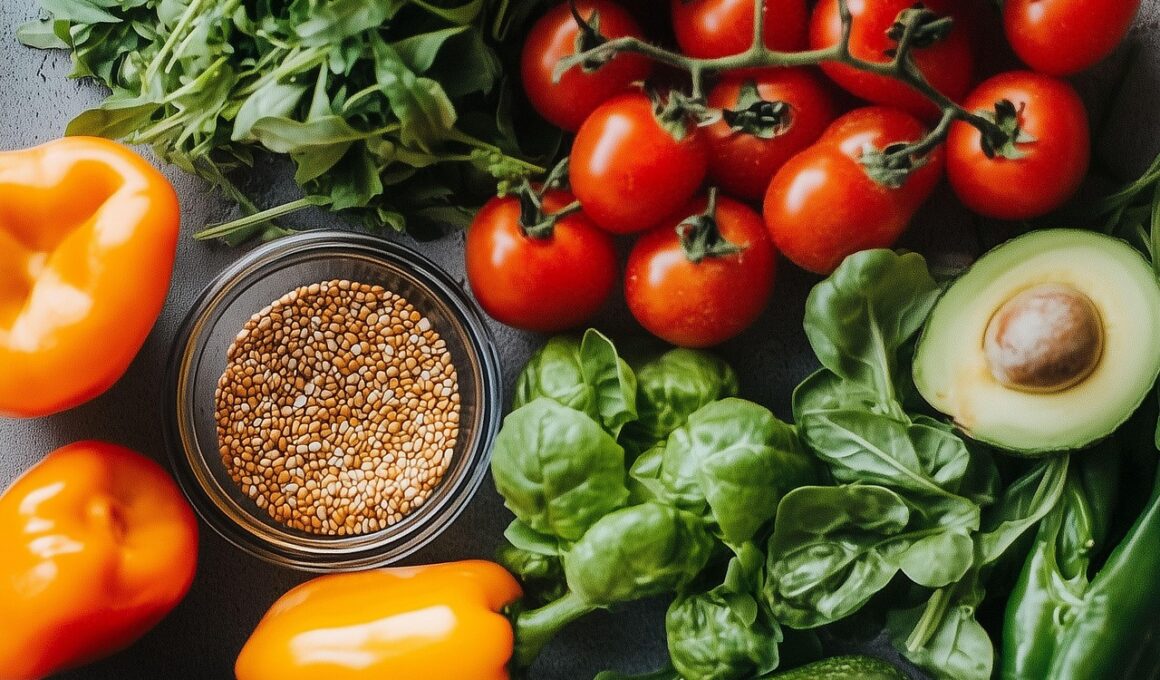The Role of Hydration in Detox and Cleansing Diets
Hydration is a foundational aspect of any detox and cleansing diet plan. The human body is primarily composed of water, making it essential for various bodily functions. One of the most significant roles water plays is aiding in the elimination of toxins. Adequate hydration helps the kidneys filter waste from the blood, allowing these toxins to be expelled through urine. This function is crucial during a detox process as it accelerates the removal of harmful substances accumulated over time. Additionally, staying hydrated supports digestion, nutrient absorption, and circulation. Without sufficient water intake, individuals may experience fatigue or headaches, which can impede the detox process. Furthermore, adequate hydration aids skin health, promoting a radiant complexion, enhancing detoxification during diets. Effective cleansing often includes hydrating ingredients like coconut water, herbal teas, or infused waters. These options not only help meet hydration needs but also provide additional nutrients that can enhance the body’s detoxification abilities. Therefore, incorporating various fluids into daily dietary routines is vital, ensuring that the body receives ample hydration during detoxification, leading to better overall health and vitality.
Water acts as a solvent, helping dissolve minerals, vitamins, and other nutrients essential for bodily functions. When undergoing a detox, it is particularly beneficial to increase fluid intake. This process can facilitate the rapid removal of toxins while supporting metabolic functions. Other benefits of proper hydration include a more efficient lymphatic system, which is essential for transporting immune cells throughout the body. When the body is dehydrated, the lymphatic system can become sluggish, making detoxification less effective. Herbal teas and infusions are excellent options to support this process, providing antioxidants along with hydration. Green tea, for instance, is known for its detoxifying properties and can help enhance hydration levels. Moreover, during a detox, eating water-rich foods like fruits and vegetables can further contribute to hydration. Foods such as cucumbers, watermelon, and oranges not only keep the body hydrated but also offer additional vitamins and minerals necessary for recovery. The incorporation of these foods can improve overall wellness as one embarks on a cleansing journey. Thus, hydration must be strategically planned throughout detox diets to enhance their effectiveness and encourage a healthy, glowing body.
Benefits of Hydration in Detox
Regular hydration brings numerous benefits, especially during a detox diet. It aids digestion by facilitating the breakdown of food, making it easier for the body to absorb nutrients. Among the many positive effects of hydration, it promotes regular bowel movements, preventing constipation, which is often a concern during purification diets. When detoxing, individuals often consume fewer solid foods than usual, thus emphasizing the importance of drinking enough fluids to keep everything moving smoothly through the digestive tract. Furthermore, staying hydrated supports kidney health, ensuring that the kidneys efficiently filter toxins and waste products from the bloodstream. This function is fundamental to the detox process, as those toxins must be expelled effectively. Drinking plenty of fluids can also reduce cravings, making it easier for individuals to stick with their detox plan. When the body is well-hydrated, it can feel more energetic and less reliant on unhealthy snacking. In addition to physical benefits, hydration positively impacts mental clarity, an essential aspect of remaining focused throughout the detox journey. Therefore, prioritizing hydration should be a fundamental component of every effective detoxification approach.
Electrolytes play a vital role in hydration, and maintaining their balance is crucial during a detox diet. Sodium, potassium, and magnesium are essential electrolytes that help regulate fluid balance within the body. They assist in muscle function and maintain optimal hydration levels. During detoxification, individuals may lose electrolytes through various means, including sweat and urine. This loss can lead to dehydration, resulting in fatigue and muscle cramps. To offset this effect, incorporating electrolyte-rich beverages like coconut water or homemade electrolyte solutions can be beneficial. Additionally, consuming fruits and vegetables that are naturally high in electrolytes can enhance hydration further. Bananas, avocados, and leafy greens, for instance, offer both hydration and vital nutrients. Staying mindful of electrolyte levels ensures the detox process remains effective while avoiding unwanted side effects. Some individuals may opt for commercial electrolyte drinks, though homemade options are generally healthier and more cost-effective. The proper balance of water and electrolytes ensures the body can perform optimally, supporting overall health during detox. Consequently, being proactive about hydration and electrolyte intake can lead to a more successful cleansing experience, promoting better well-being and vitality.
Practical Hydration Tips for Detox
Incorporating effective hydration strategies during a detox diet can greatly enhance results. Setting specific water intake goals throughout the day is an excellent place to start. Many experts recommend consuming at least eight 8-ounce glasses daily as a baseline. However, this amount may vary based on activity levels and environmental factors. To make hydration more appealing, consider infusing water with fruits and herbs for added flavor. Options like lemon, mint, or berries can make drinking more enjoyable and encourage greater intake. Another practical tip is to keep a water bottle handy to sip throughout the day, reducing the temptation to reach for sugary drinks. Tracking water consumption through apps or journals can also promote accountability and make hydration a priority. Additionally, scheduling water breaks during meals or snacks can create a routine that reinforces the habit of drinking enough fluids. Finally, remind yourself to listen to your body’s signals. Thirst is a natural indicator but can be easily overlooked. By adopting these hydration tips, individuals can ensure that their detox diets yield optimal health benefits.
While hydration is essential, it is important to recognize that not all beverages contribute equally to the detox process. Some drinks, such as sugary sodas and alcohol, can hinder efforts to cleanse the body effectively. These beverages often lead to dehydration and frustrate detoxification goals. Instead, opt for herbal teas, fruit-infused waters, or vegetable broths that support hydration and provide antioxidants. Green tea, for example, contains catechins that promote liver health and enhance detoxification. Consuming vegetable juices does provide hydration but also helps the body absorb phytonutrients. Always choose natural ingredients whenever possible to maximize the benefits of beverages during detox. Smoothies made with leafy greens and hydrating fruits can provide an excellent base for detox diets. Not only do they supply hydration, but they also deliver necessary vitamins and minerals to support cleansing. As individuals explore various drinks, they will find that creativity can lead to enjoyable recipes to maintain hydration levels. Thus, making informed beverage choices is as important as focusing on water, ensuring the detox journey is both delicious and effective.
Conclusion
In conclusion, hydration plays a crucial role in the success of detox and cleansing diets. By emphasizing fluid intake throughout the cleansing process, individuals can ensure that their bodies are effectively eliminating toxins while feeling energized and revitalized. Incorporating various drinks, including herbal teas, infused waters, and nutrient-rich smoothies, enhances hydration and contributes vital nutrients necessary for optimal health. Alongside proper hydration, maintaining a balanced intake of electrolytes is essential to prevent fatigue and promote smooth functioning during detox. The connection between hydration and detoxification cannot be overstated, as it directly impacts digestion, nutrient absorption, and toxin elimination. Therefore, individuals embarking on a detoxification journey should prioritize water and mindful beverage choices to support their overall wellness. Practical hydration tips, including setting goals and experimenting with flavors, can make the process enjoyable. Ultimately, a well-planned hydration strategy complements the detox diet and leads to improved health outcomes. So fill that water bottle, enjoy those nutritious drinks, and reap the benefits that proper hydration brings during your next detox adventure.
Each of the hydration techniques discussed promotes effective detoxification while enhancing overall wellness. By being mindful of what to drink and how much, individuals can make significant strides in achieving their health goals. Following detox diets doesn’t have to be merely a challenge; instead, it can be a rewarding experience when paired with appropriate hydration practices. The importance of staying hydrated extends beyond cleansing diets into everyday living. Prioritizing fluid intake daily can lead to lasting improvements in energy levels, digestive health, and mental clarity. With each sip of water or healthy hydrating beverage, individuals foster a healthier lifestyle that supports their long-term wellness. As people begin to make hydration a habit now, they will find that integrating it into their detox journeys becomes a seamless and enjoyable part of the experience. Remember, the journey of detoxification is not just about eating and drinking; it’s a holistic approach to nurturing the body. By maintaining balance and focus on hydration, individuals prepare themselves for success and renewed vitality. Therefore, start today with conscious hydration choices and embrace the benefits during your cleansing diet.


